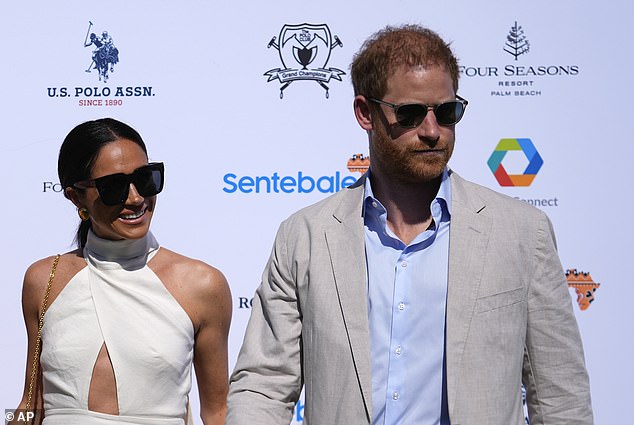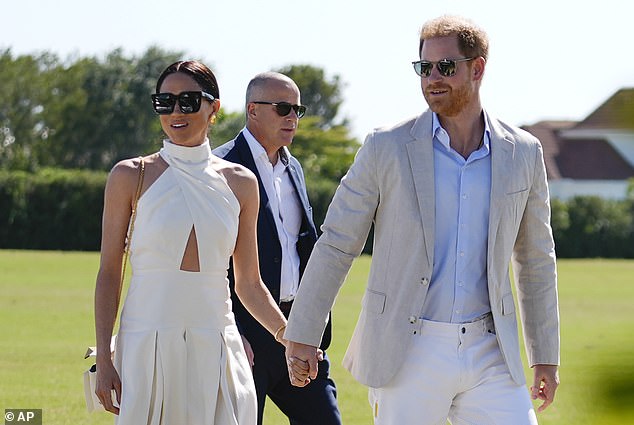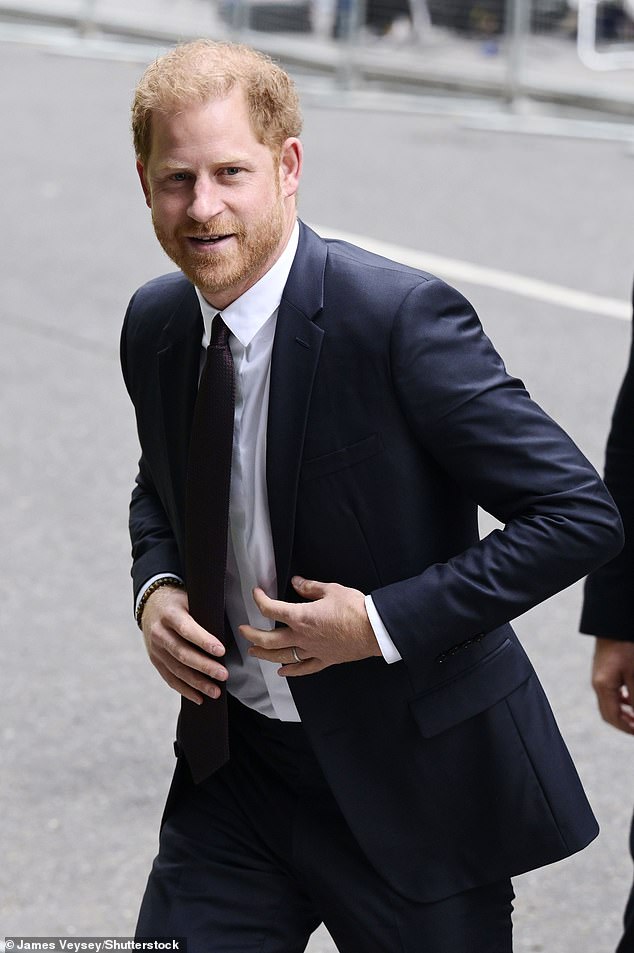Prince Harry was today ordered to repay taxpayers after losing his High Court battle with the Home Office for downgrading his police protection.
He potentially faces a bill of around £1 million when his own legal costs are taken into account.
A judge rejected an offer to halve the amount he had to pay saying the Duke of Sussex had “completely lost” his case.
Separately, Sir Peter Lane also dismissed the duke’s request to appeal against the ruling, describing a section of it as “frankly desperate”.
Harry, who had previously vowed to appeal the case, can still go directly to the Court of Appeal if he wishes to continue with the case.
The twin rulings are another legal blow for the duke after he lost his two-year battle for the Home Office in February.
Prince Harry (pictured at the High Court last June) was today ordered to repay taxpayers after losing his High Court battle with the Home Office for downgrading his police protection.
Harry had taken the Home Office to court for no longer receiving the “same degree” of protection after he and Meghan left royal life and Britain in January 2020.
He had compared the dangers to himself and his family to the risks his mother, Princess Diana, faced before her death in 1997 while being pursued by paparazzi.
The Home Office spent more than £500,000 of public money successfully fighting the case. After losing, Harry’s lawyers argued in written submissions that he should only have to pay no more than half of the public’s legal costs.
But Sir Peter ruled: “I have no doubt that the claimant’s claim that his liability for costs should be subject to a 50-60% reduction is unsustainable.” He added “for the avoidance of doubt” that the duke’s suggestion that his case had been “partially successful” was unfounded.
The judge agreed with Harry’s lawyers that the Home Office had committed certain breaches of legal rules, but said these “did not alter the fact that the claimant lost completely”.
Sir Peter ordered the duke to pay 90 per cent of the public’s legal bill. The exact sum was not specified.
But figures released via a Freedom of Information request a few weeks ago revealed that the government had so far spent £514,128, including more than £180,000 on lawyers, £320,000 on solicitors from the Government Legal Department and £2,300 sterling in court fees.
Harry’s legal costs have not been revealed, but could be similar.

Prince Harry, right, and his wife Meghan Markle, Duchess of Sussex, arrive for the Royal Salute Polo Challenge 2024 to benefit Sentebale, April 12, 2024.
The judge also rejected Harry’s application for permission to appeal, saying his application was “largely a recapitulation” of the case he had already lost.
He said there were “no compelling reasons” to allow an appeal to proceed. Sir Peter said that just because the case concerned the “protection of life” did not give Harry a compelling reason, because otherwise “there would be a large number” of appeals in the immigration courts under the Refugee Convention.
Following the previous ruling in February, a spokesman for the duke said he intended to challenge the ruling, adding that Harry “hopes to get justice from the Court of Appeal.”
Prince Harry continues to insist that the withdrawal of guaranteed police protection makes him vulnerable when he visits the UK.
You must provide 30 days’ notice of any travel plans so that each visit can be evaluated on its merits. Sources close to him have been quoted as saying that he is not willing to return to Meghan or her children without the level of security he believes he needs.
Harry got a 10 per cent discount on his legal costs after the judge penalized the government for delaying the provision of key documents about Ravec’s operation.

Sources close to him have been quoted as saying that he is not willing to return to Meghan or their children without the level of security he believes he needs. Pictured: Harry and Meghan at a polo event on Friday.
Ravec is the Executive Committee for the Protection of Royalty and Public Figures, which reports to the Ministry of the Interior and oversees security arrangements for the royal family and other VIPS.
Sir Peter said the Home Office had not acted in bad faith but its failure to provide information to the duke was “sanctionable”.
However, the judge ruled that it was “frankly unhelpful” for Harry’s lawyers to have suggested that the court “should not allow ‘deference’ to Ravec’s decision-making because the matter involved the protection of an individual.”
The judge also revealed that Harry had been forced to apologize for breaching confidentiality rules in his own case.
The duke shared private information from the High Court case with MP and veterans minister Johnny Mercer, who has long shared a bond with the prince.
Judge Lane revealed how, during the course of the sensitive case, the duke had “breached the terms of the circle of confidentiality order by emailing certain information to an associate of Schillings, who was not within the circle of confidentiality, and to the Rt Hon Johnny Mercer MP’.
He said the breach was quickly detected by Harry’s own lawyers who alerted the court. The judge said: “The plaintiff has apologised.”
The Home Office said: “While we are satisfied with the Court’s decision to refuse permission to appeal, it would be inappropriate to comment further on the ongoing legal proceedings.”

